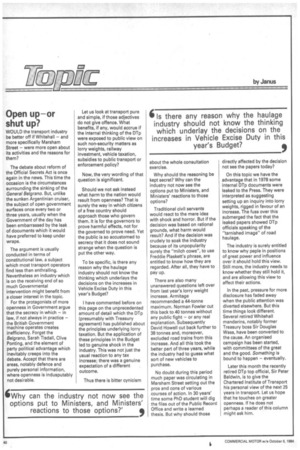Open up—or shut up?
Page 44

If you've noticed an error in this article please click here to report it so we can fix it.
WOULD the transport industry be better off if Whitehall — and more specifically Marsham Street — were more open about its activities and the reasons for them?
The debate about reform of the Official Secrets Act is once again in the news. This time the occasion is the circumstances surrounding the sinking of the General Be'gran°. But, unlike the sunken Argentinian cruiser, the subject of open government surfaces once every two or three years, usually when the Government of the day has been embarrassed by the leak of documents which it would have preferred to keep under wraps.
The argument is usually conducted in terms of constitutional law, a subject which most transport operators find less than enthralling. Nevertheless an industry which is on the receiving end of so much Governmental intervention might benefit from a closer interest in the topic.
For the protagonists of more openness in Government argue that the secrecy in which — in law, if not always in practice — the British Government
machine operates creates inefficiency. Forget the Be!gran°, Sarah Tisdall, Clive Panting, and the element of party political advantage which inevitably creeps into the debate. Accept that there are areas, notably defence and purely personal information, where openness is indusputably not desirable.
Let us look at transport pure and simple, if those adjectives do not give offence. What benefits, if any, would accrue if the internal thinking of the DTp were exposed to public view on such non-security matters as lorry weights, railway investment, vehicle taxation, subsidies to public transport or enforcement policy?
Now, the very wording of that question is significant.
Should we not ask instead what harm to the nation would result from openness? That is surely the way in which citizens of a free country should approach those who govern them. It is for the governors to prove harmful effects, not for the governed to prove need. Yet the public is so accustomed to secrecy that it does not sound strange when the question is put the other way.
To be specific, is there any reason why the haulage industry should not know the thinking which underlays the decisions on the increases in Vehicle Excise Duty in this year's Budget?
I have commented before on this page on the unprecedented amount of detail which the DTp (presumably with Treasury agreement) has published about the principles underlying lorry taxation. But the application of these principles in the Budget led to genuine shock in the industry. This was not just the usual reaction to any tax increase; there was a genuine expectation of a different outcome.
Thus there is bitter cynicism about the whole consultation exercise.
Why should the reasoning be kept secret? Why can the industry not now see the options put to Ministers, and Ministers' reactions to those options?
Traditional civil servants would react to the mere idea with shock and horror. But if the decision was based on rational grounds, what harm would result? And if the decision was crudely to soak the industry because of its unpopularity surely the "milch cows", to use Freddie Plaskett's phrase, are entitled to know how they are regarded. After all, they have to pay up.
There are also many unanswered questions left over from last year's lorry weight increase. Armitage recommended a 44-tonne maximum. Norman Fowler cut this back to 40 tonnes without any public fight — or any real explanation. Subsequently David Howell cut back further to 38 tonnes and, moreover, excluded road trains from this increase. And all this took the better part of three years, while the industry had to guess what sort of new vehicles to purchase.
No doubt during this period much paper was circulating in Marsham Street setting out the pros and cons of various courses of action. In 30 years' time some PhD student will dig the files out of the Public Recorc Office and write a learned thesis. But why should those directly affected by the decision not see the papers today?
On this topic we have the advantage that in 1978 some internal DTp documents were leaked to the Press. They were interpreted as suggesting setting up an inquiry into lorry weights, rigged in favour of an increase. The fuss over this submerged the fact that the leaked papers showed DTp officials speaking of the "tarnished image" of road haulage.
The industry is surely entitled to know why peple in positions of great power and influence over it should hold this view. Still more, the industry needs to know whether they still hold it, and are allowing this view to affect their actions.
In the past, pressure for more disclosure has faded away when the public attention was diverted elsewhere. But this time things look different. Several retired Whitehall mandarins, notably former Treasury boss Sir Douglas Wass, have been converted to the cause. An organised campaign has been started, with committees of the great and the good. Something is bound to happen — eventually.
Later this month the recently retired DTp top official, Sir Peter Baldwin, is to give the Chartered Institute of Transport his personal view of the next 25 years in transport. Let us hope that he touches on greater openness. If he does not perhaps a reader of this column might ask him.




























































































































































